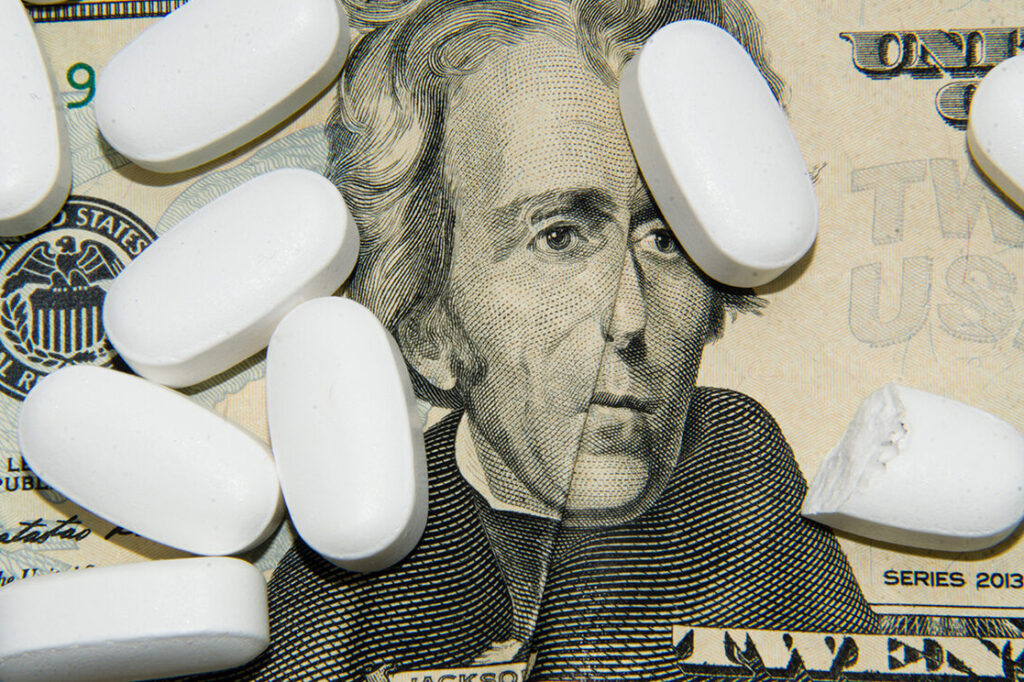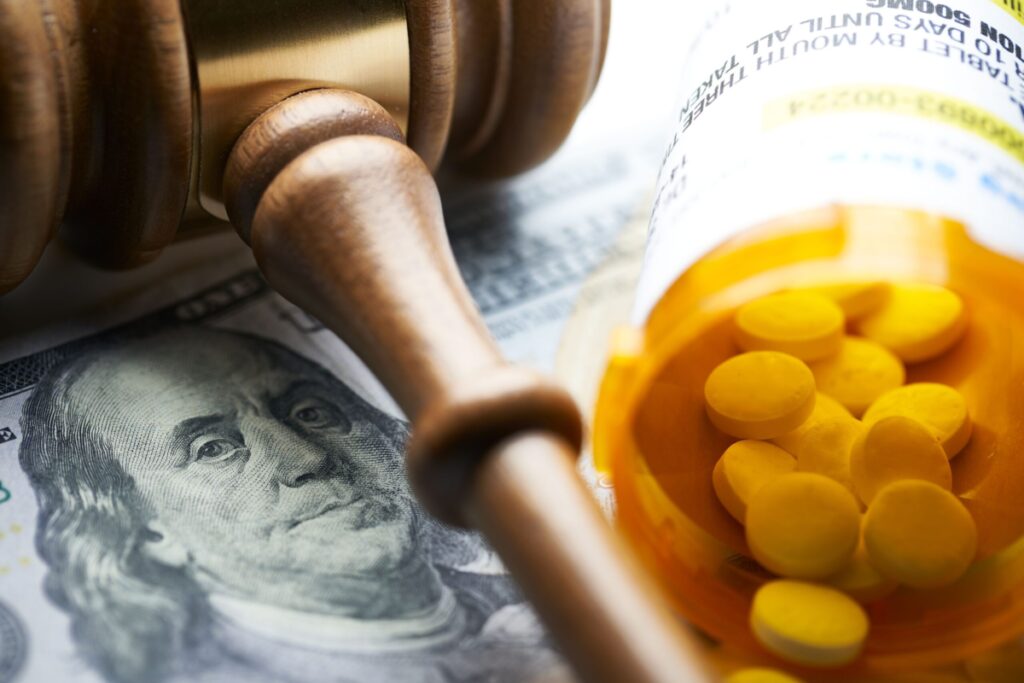Section 1. Statement of Legislative Intent; Purpose
Whereas pharmaceutical marketing impacts clinical decision-making, outcomes, and resource utilization;
Whereas marketing strategies may keep prescription drug prices high by aggressively marketing patented products to limit generic competition;
Whereas aggressive marketing of opioids fueled the opioid epidemic;
Whereas evidence-based prescribing can reduce health care costs and save lives;
Therefore, be it resolved that [State] will require Pharmaceutical Representatives to obtain a license to conduct business in [State]. Pharmaceutical Representatives must participate in professional education, including training on ethical standards, and Pharmaceutical Representatives must disclose information about the extent and nature of their interactions with health professionals as conditions of licensure.
Section 2. Definitions
For the purposes of this section, the following terms will have the following meanings:
(a) “Health care professional” shall mean any physician or other health care practitioner who
is licensed to provide health care services or to prescribe pharmaceutical or biologic products.
(b) “Pharmaceutical” means a medication that may legally be dispensed only with a valid prescription from a health care professional.
(c) “Pharmaceutical Representative” means a person who markets or promotes pharmaceuticals to health care professionals on behalf of a pharmaceutical manufacturer for a fee. Pharmaceutical representatives include pharmaceutical sales representatives and medical science liaisons.
Section 3. Licensure of Pharmaceutical Representatives
(a) License – Required.
(1) No person shall act as a pharmaceutical representative in [State] without first having obtained a pharmaceutical representative license.
(2) In order to become initially licensed, a pharmaceutical representative shall complete a professional education course as determined by the [State Agency responsible for professional regulation] prior to application for the license and affirm that this training was completed on the application for the license.
(3) To maintain a license, a pharmaceutical representative must complete minimum continuing education in accordance with subsection (e).
(b) License – Non-transferability. No transfer of ownership shall be allowed on any license issued under this section.
(c) License – Application. An application for a pharmaceutical representative license shall be made to the [State Agency responsible for professional regulation] on a form accessible at the [State Agency responsible for professional regulation] website, and shall include the following:
(1) The applicant’s full name, residence address, residence telephone number, business address and business telephone number;
(2) A description of the type of work in which the applicant will engage;
(3) The license fee;
(4) An attestation of professional education:
(A) In the case of an initial license, attest that the applicant has completed a professional education course in compliance with subsection (e); or
(B) In the case of a renewal, attest that the applicant has completed at least five hours of continuing professional education in the previous year in compliance with subsection (e);
(5) Proof that the applicant has paid any assessed penalties and fees; and
(6) Any other information that the [State Agency responsible for professional regulation] may reasonably require.
(7) Any changes made to the information submitted on the application or any material changes made to the licensee’s personal or businesses operations or to any information provided under this section must be reported, in writing, to the [State Agency responsible for professional regulation] within four business days of the change.
(d) License – Fee. The annual fee for a pharmaceutical representative license shall be $750.00.
(e) Professional education.
(1) The [State Agency responsible for professional regulation] shall establish by rule education requirements as a condition for an initial or a renewal pharmaceutical representative license. All pharmaceutical representatives shall complete a minimum of five hours of continuing professional education prior to renewing their license. The initial and continuing professional education must include training in ethical standards, whistleblower protections, laws and regulations applicable to pharmaceutical marketing, and other areas that the [State Agency responsible for professional regulation] shall designate by rule.
(2) Upon request, pharmaceutical representatives shall provide proof of completion of the professional education requirements to the [State Agency responsible for professional regulation].
(3) The [State Agency responsible for professional regulation] shall designate and publish a list of institutions that provide courses that meet the education requirements. The [State Agency responsible for professional regulation] shall also designate the courses that satisfy the education requirements. A professional education provider shall not be a pharmaceutical representative’s employer. Education providers must disclose conflicts of interests. Funding for education courses shall not be provided by the pharmaceutical industry or by a third-party funded by the pharmaceutical industry.
Section 4. Disclosure to State
(a) No later than June 1 of each calendar year, pharmaceutical representatives shall provide the following information from the previous calendar year, to the [State Agency responsible for professional regulation]:
(1) The aggregate number of times health care professionals in [State] were contacted;
(2) The specialties of the health care professionals contacted;
(3) The location and duration of contact, including telephone, in-person, and on-line contact;
(4) The pharmaceuticals promoted;
(5) Whether product samples, materials, or gifts of any value were provided to the health care professional;
(6) The value of any products, materials, gifts, or compensation provided;
(b) The [State Agency responsible for professional regulation] shall make this information publicly available on the [State Agency responsible for professional regulation] website in a manner in which individual health care professionals are not identifiable by name or other identifiers such as National Provider Identifiers.
(c) The [State Agency responsible for professional regulation] shall produce a public annual report to the legislature summarizing the disclosures and identifying trends. The report is due November 1 each calendar year.
(d) A model disclosure form may be issued to facilitate compliance with the disclosure requirements of this section.
Section 5. Disclosure to Health Care Professionals
(a) Pharmaceutical representatives must disclose the following information during each visit with a health care professional:
- The wholesale acquisition cost of a prescription drug when the pharmaceutical representative provides information concerning the drug to the prescriber.
- The names of at least three generic prescription drugs from the same therapeutic class, or if three are not available, as many are available for prescriptive use.
Section 6. Ethical Standards
(a) The [State Agency responsible for professional regulation] shall produce a list of ethical standards for pharmaceutical representatives that shall be incorporated into the rules and published on the [State Agency responsible for professional regulation] website. In addition to those rules, a pharmaceutical representative shall not:
(1) Engage in any deceptive or misleading marketing of a pharmaceutical product, including the knowing concealment, suppression, omission, misleading representation, or misstatement of any material fact;
(2) Use a title or designation that could reasonably lead a licensed health professional, or an employee or representative of a licensed health professional, to believe that the pharmaceutical detailer is licensed to practice medicine, nursing, dentistry, optometry, pharmacy, or other similar health occupation, in [State], unless the pharmaceutical detailer currently holds such a license; or
(3) Attend patient examinations without the consent of the patient.
Section 7. Enforcement
(a) Pharmaceutical representatives must display their license during each visit with a health care professional. Health care professionals that meet with a pharmaceutical representative not displaying a license may report the unlicensed pharmaceutical representative to the [State Agency responsible for professional regulation] for further action.
(b) Health care professionals who meet with a pharmaceutical representative not sharing the information required in Section 5(a) may report the pharmaceutical representative to the [State Agency responsible for professional regulation] for further action.
(c) Fine: Any person violating any of the provisions of this chapter shall be fined not less than $1,000 nor more than $3,000 for each offense. Every day such violation continues shall constitute a separate and distinct offense.
(d) License Suspension and Revocation: A violation of any of the provisions of this chapter may result in license suspension or revocation in accordance with [cite relevant State Statute]. No license suspended or revoked pursuant to this section shall be reinstated until all code violations related to the suspension or revocation have been remedied and all assessed penalties and fees have been paid. No person whose pharmaceutical license under this chapter is revoked for any cause shall be granted a license under this section for a period of two years from the date of revocation.
(e) Rules – The [State Agency responsible for professional regulation] shall have the authority to promulgate rules necessary to implement their respective powers and duties under this Article.



